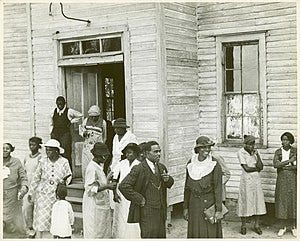Six Reasons Why The Black Church Is Not “Wack”
With all the recent conversation about the recent comments made by gospel superstar and pastor Tye Tribbett and relevance of the church, I thought it would be helpful to not just talk about the failures of the church, but also offer a counter narrative about the influence and impact of the church, particularly the historically Black Church.
The following is actually a sample of a new book that I’m working on about the legacy of Justice work in the Black Church and the impact it can have on the current disability justice movement.
When it comes the historically Black Church in America, there are several ways that its influence has helped shape our nation for the better. Many of the contributions of the Black Church has been documented well by church historians. It’s because of their courageous work that the history of the Black church continues to be exposed to the Christian church in America and to the nation al large. With that being said, there are still some aspects of the Black church that are not quite highlighted enough and I want to share some the ways that the Black church helped to shape politics and religion in America.
The Black Church was an extension of African Traditional Religion(s) mainly from the Western part of the continent of Africa. Until approximately the 1740’s most African slaves were prohibited from becoming Christian because White slaver owners feared that their slaves would begin to claim equality with Whites. This is important to know because when Africans began merging their indigenous religions with Christianity, they did not simply accept the version of Christianity their were introduced to. This dispels the myth that Blacks in America have simply surrendered to White Christianity. Black people have always stood in contention with colonial Christendom.
The Black church often does not get the recognition for being one of the first and most prominent deconstruction movements in early American history. Black spirituality led the way in being one of the most critical forces in the advancement of Biblical interpretation in American Christianity. When Black Christians read the Bible, their experience of being oppressed helped them develop an interpretation of the Biblical text that saw God as a liberator of the oppressed. It was enslaved Africans and freed Blacks that began the process of decolonizing Christianity in the Western world.
The Black Church actually precedes the birth of America. There were African Baptist congregations that emerged in the South as early as 1773 in Silver Bluff South Carolina. This is important to note because it means that the Black Church is in fact an American Institution and one that has existed since the inception of America. The Black church is one of the oldest American Institutions, born out of American ingenuity and demonstrating American resilience.
Black Churches were educational hubs and leadership incubators for the Black community. Several Historically Black Colleges and Universities were either founded by Black Churches or held classes in facilities owned by Black Churches. Black Churches had an extremely high value for education and intellectually development for the Black community. Forming and supporting high education was the Black Churches way of contributing to the overall self-sufficiency of Blacks in a time where they were prevented from enrolling in predominantly white colleges and universities. Several prominent social and civil rights leaders emerged from the Black Churches efforts to create leaders in their communities.
Black Churches were the social and political center for Black Americans. Although the Black church formed out of a need for aa safe space to worship, the Black church was far from embracing the American ideal. As as a political hub, the Black Church helped to strategize and organize a movement that was actually aimed at helping America live up to her ideals of equality, equity, and freedom. The Black Church was the Black community’s contribution to the pursuit of the American dream and not it’s antithesis. In the eyes of the Black community and the historically Black church, it was White Christian theology and politics that was failing to live up to the Christian and American Ideal that all people are valuable in the eyes of God.
Black Churches made extraordinary contributions to the arts. As a true incubator for ingenuity and creative genius the Black church influenced the burgeoning of several musical genres including the spirituals, gospel, the blues, jazz, and hip hop. The Black Church is also often credited with giving us the “Motown Sound” that produced such great acts as Smokie Robinson, The Temptations, Marvin Gaye, The Supremes, Stevie Wonder, and The Jackson 5 just to name a few. The musical style that was created in the Black Church has influenced nearly every genre in contemporary American Music, which in turn influenced theater and other visual arts that we enjoy today.
All of these examples, though not consistently discussed in history, serve as evidence that the historically Black Church in America operated with a spirituality that was born out of the story of enslaved Africans and freed Blacks making sense of their plight and predicament as slaves and strangers in a new world, making their way through a new and a evolving religious tradition, all while being motivated by their faith to push American Christianity and politics toward a practice of faith that would ensure their rights as citizens of God’s kingdom and their rights as citizens of America. Black spirituality in the earliest days of the birth of the Black Church leading all the way up to the Civil Rights Movement, is nothing short of miraculous and awe inspiring.





